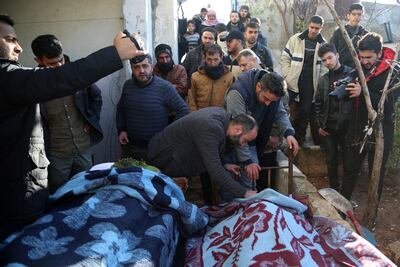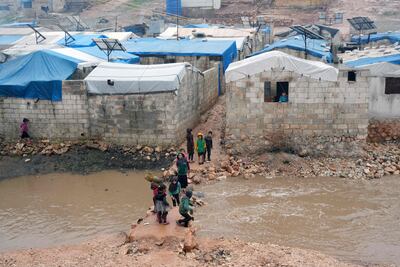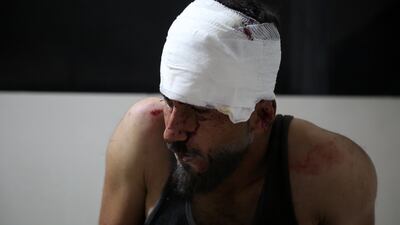Live updates: Follow the latest news on Israel-Gaza
The weekend missile strike in the heart of Damascus shows how quickly the Israel-Gaza war is turning into a regional conflict and how violence is spreading across Syria as all players seek to capitalise from the chaos.
Blamed on Israel, Saturday’s strike killed Haj Sadiq Ameed Zada, the commander of Iran's intelligence service, and four of his colleagues in Damascus’s diplomatic quarter. Israel seldom comments on such actions.
The attack, which also killed several civilians, shows how Israel's war in Gaza has spilt into Syria.
Since the conflict began after the October 7 Hamas attacks on Israel, rockets have been fired from Syria into northern Israel and the Israeli-occupied Golan Heights.
Meanwhile, Iran-backed proxies in Syria and Iraq are unleashing scores of attacks on US bases in the two countries, prompting retaliatory strikes and threatening to drag the US deeper into a broad Middle East conflict just as it tries to extricate itself from the region.
It is against this complex backdrop that experts say the regime of Syrian President Bashar Al Assad is looking to benefit.
He has increased attacks on rebel-held areas across northern Syria, escalating the nearly 13-year civil war that had until recently been at a relative standstill.
Syria’s Civil Defence Force, better known as the White Helmets, has warned Washington about an increase in artillery and missile attacks in north-western Syria since October, a US State Department official said.
The “unusual intensity of the attacks” had hit population centres far from the civil war’s normal front lines, the official told The National, “including attacks on Idlib City for the first time since Turkey and Russia reached an agreement in March 2020 to designate Idlib as a de-escalation zone".
The Assad regime’s Russian backers are supporting the rise in regime attacks, the official said, noting that these undermine regional stability and impose "a state of terror and fear, leading to displacement waves".
“Military escalation only exacerbates the suffering of the Syrian people and will only further destabilise Syria,” the official said.

Recent regime assaults on villages west of Aleppo killed six people and injured 11 more, according to the White Helmets.
Idlib’s main anti-Assad force is Hayat Tahrir Al Sham, an Al Qaeda offshoot widely seen as having open channels with Turkey.
The group has been retaliating by ambushing regime troops in neighbouring Latakia province and firing rockets at loyalist areas, opposition sources say.
“There is no comparison in firepower,” Othman Biraqdar, an aid worker in Idlib, told The National.
“The regime is using phosphorus and napalm, and the casualties are overwhelmingly civilian."
'Nobody bats an eyelid'
Idlib governorate is home to about 2.6 million people, mostly refugees who fled the regime crackdown on the 2011 pro-democracy revolt and the subsequent civil war.
Charles Lister, senior fellow and director of the Syria and Countering Terrorism and Extremism programmes at the Middle East Institute, said the rise in regime attacks is “arguably the result of events in Gaza and elsewhere in the region”.
Mr Lister told The National that noting that the sharp rise in activity is being largely ignored.
“With more than 100 people being killed in Gaza every day, and missiles crossing nation-state borders all over the region, nobody bats an eyelid when Assad decides to shell an [internally displaced persons] camp in Idlib,” he said.
“It’s sadly as simple as that.”

Mouaz Mustafa, Executive Director of the Syrian Emergency Task Force, which operates a women's centre and orphanage in opposition-held areas, says that for civilians in Syria, the war in Gaza has been a reminder of their own experiences.
“It's been heart-breaking because they also sympathise and know how the innocent civilians in Gaza feel … But the war in Gaza has taken attention away from Syria, which the regime always loves, [Mr Assad] doesn't want people to know that he is continuing to kill civilians.”
Merissa Khurma, director of the Middle East Programme at the Wilson Centre, said the Israel-Gaza war has allowed Mr Al Assad to return to his “old-guard messaging.”
He is “going back to the narrative that he's been championing, which is engaging with the West doesn't work, And that alliances with the West do not serve the interests of the region and its people", Ms Khurma told The National.
The attacks on Idlib also help the regime to distract attention from the country’s economic woes, says Wael Olwan, a senior research fellow at the Jusoor Information Centre in Istanbul.
They also serve to shift focus from loyalist troop losses and military deaths from Israeli attacks in Syria.

Experts also point to Tehran’s role in regime attacks, saying Iran uses Idlib to distract from damage and deaths incurred by Israeli air raids on Iranian proxies in Syria.
Russia, the Assad regime’s top backer, has left a margin for Iran to operate in Idlib, Mr Olwan said.
“Neither Assad nor Iran want relative stability in Idlib, and Russia is going along,” he told The National.
Ms Khurma said that for Iran and Iran-backed nations and proxies, “there's an opportunity to press buttons and project power".
Russia, meanwhile, seeks to use the violence as a tool to keep Turkey in check, especially as Moscow and Ankara’s positions diverge over Ukraine, Mr Olwan said.
But Russia “does not want a land invasion of Idlib and a collapse of the current map”, he said.
The war has also affected a major chunk of the Turkish zone of control in the north-west of Syria.
The fallout from the Israel-Gaza war, including a sharp increase in attacks on Washington's own forces in Iraq and Syria, has again complicated the US goal of moving away from the Middle East as it emphasises its strategy in the Indo-Pacific.
For Ms Khurma, the question of what Washington should do as it works around regional hostilities has a simple answer: “Listen to your allies in the region,” particularly those who have been “calling for a ceasefire” in Gaza.
She said tough decisions must be made about what the region will be like in a few months if the Israel-Gaza war continues.
The escalating regional dynamic “is very much the result of years on various portfolios in the region that are key to US national security interests that have been left unresolved, whether we're talking about the lingering Palestinian-Israeli conflict, or we're talking about Syria,” Ms Khurma said.
“When the United States disengages or withdraws politically from an important theatre such as the Middle East, then others fill in the gap.”


